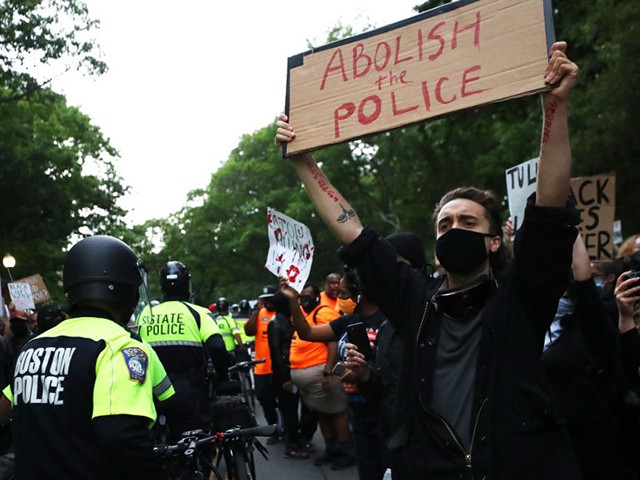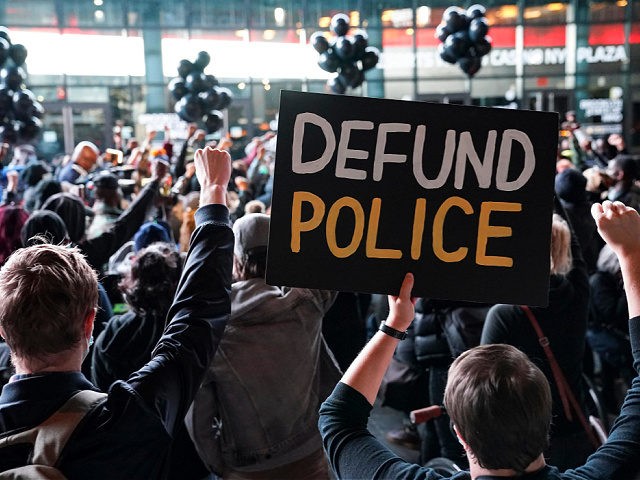Decline in support for the “defund the police” movement signals that “racial equity is a tertiary issue,” according to a New York Times (NYT) op-ed mourning the apparent “death” of the issue, regretting it had not “caught on broadly enough,” and warning Americans will yet “regret” rejecting it.
The Wednesday New York Times essay titled “‘Defund the Police’ Is Dead. Now What?” and penned by left-wing opinion columnist Charles M. Blow, claimed, “both the slogan and the substance” of the “defund the police” movement, “appears to be dead.”
“Its opponents beat it to death, not that it was ever wildly popular,” he wrote.
Citing an October Pew poll that found “support for reducing spending on the police had fallen significantly,” Blow lamented that “the numbers have always been low.”
He also cited a Pew analysis from this week that indicated “uniformity among Black Democrats and Black Republicans” on the issue.
Noting that the 2020 underperformance of Democrats was blamed by party leaders in part on the defund the police movement, Blow argued that “Republicans believe it harms Democrats” who are now “running scared from the slogan.”
He then admits that “less public appetite for doing anything that might reduce a community’s police presence” came as “violent crime began to rise.”
According to Blow, such attitudes culminated in President Joe Biden’s “Safer America Plan” speech this week whereby the president said, “When it comes to public safety in this nation, the answer is not ‘defund the police,’ it’s ‘fund the police.’”
“It was the capstone in the crusade against the defund movement, and possibly the gravestone of the movement itself,” Blow said, adding that it was a mere echo of the president’s position during his State of the Union address.
Though the author expresses his belief that “redirecting some of the money police departments receive toward other services is a good idea” and that “continuing to pour money into a system that is on many levels broken is a bad idea,” he claims to be “enough of a realist to understand when my position is not one that caught on broadly enough.”
“I register the fact that the movement to defund the police hit a wall,” he admitted.
Blow then turns to those — particularly liberals — who “rail against the movement,” asking, “If not redistributing funding, then what?”
“The issue that launched the push to defund the police — police shootings — has not changed,” he wrote, citing statistics that supposedly point to a disproportionate rate of black Americans and Hispanic Americans shot and killed by police.
“What do we do about this?” he asks. “Have we simply become inured to these horrific numbers? Do these lives no longer matter?”
Blow expresses his regret that the “summer of protest was fueled in part by cabin fever with Covid lockdowns,” though he wished “so badly to be wrong about that.”

Demonstrators attend a protest organized by Black Lives Matter in response to the death of George Floyd, an African American, at the hands of Minneapolis, Minnesota, police, on June 02, 2020, in Boston, Massachusetts. (Photo by Maddie Meyer/Getty Images)
“But the further we get from those protests the more reversals of passions and policies I see,” he claims, asking, “Do police killings only upset us when there are fewer killings by civilians?”
The essay concludes with Blow expressing his fear that “the signal we are sending to all the people who truly believed that there would finally be real change in policing and the possibility of more equity in our criminal justice system is that racial equity is a tertiary issue, that it is lower than people want to admit on the social hierarchy of policy priorities.”
“We will regret that,” he adds.
In May, Blow accused Republicans of making the United States a “killing field” through their promotion of propaganda and an “insane” gun culture, while claiming the extraordinary levels of “American carnage” are due to the number of “American Republicans” within the country.
During the 2020 anti-police riots — the most costly in U.S. history — many leaders in blue cities caved to BLM’s call to “defund the police,” which became popular with Democrats during and after the 2020 presidential election season.
However, crime has surged nationwide after progressives campaigned endlessly against police, leading to eroded confidence in law enforcement, sunken police morale, and an officer exodus.
Following the defunding of police in many Democrat cities, murder rates rose 16 percent in 2021 across major U.S. cities, a trend that is already bleeding into 2022.
Big cities are also continuing to see an upward trend of violent crime in places such as Los Angeles and New York City — both of which defunded their departments and employed soft-on-crime “bail reform,” which allows career criminals back on the streets.
However, with a continuing crime wave across America’s big cities, poll after poll after poll has shown that a majority of voters do not support defunding police, with many expressing their belief the policy has hurt public safety and contributed to rising crime.
In response, Democrats have begun to distance themselves from the policies they pushed, at one point even attempting to blame Republicans for defunding police.
More recently, both Biden and House Speaker Nancy Pelosi (D-CA) denounced the idea, with Pelosi proclaiming that defunding police is not a policy of the Democrat Party.
In May, the radical activist group Black Lives Matter railed against the “white supremacist” institution of “policing,” decrying its roots in “racism” and “slave patrolling,” while attacking politicians who support “our killers,” in a series of tweets following President Joe Biden’s signing of an executive order on policing reforms.
In January, Brown University economics professor Glenn Loury lamented the current state of crime nationwide, as he accused BLM activists of having “buckets of blood on their hands” for their role in soaring crime and homicide rates
In December, it was revealed that BLM activists gave a talk to over 150 people, telling students that “crime is made up” and black people are “enslaved” when they are sent to jail.
Last May, Breitbart News reported that since the death of George Floyd, Hollywood has devoted significant airtime to promoting far-left racial ideologies, with one report finding that 127 TV episodes have pushed BLM, the “defund the police” movement, and the belief that America is “systemically racist.”
Follow Joshua Klein on Twitter @JoshuaKlein.

COMMENTS
Please let us know if you're having issues with commenting.